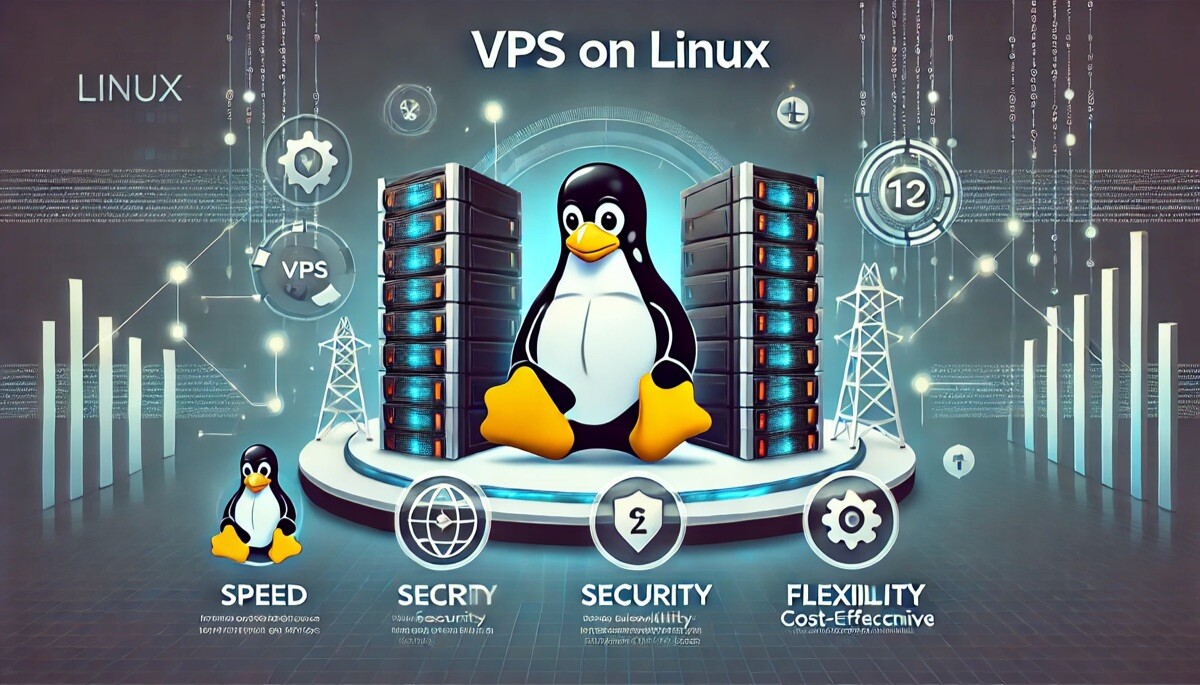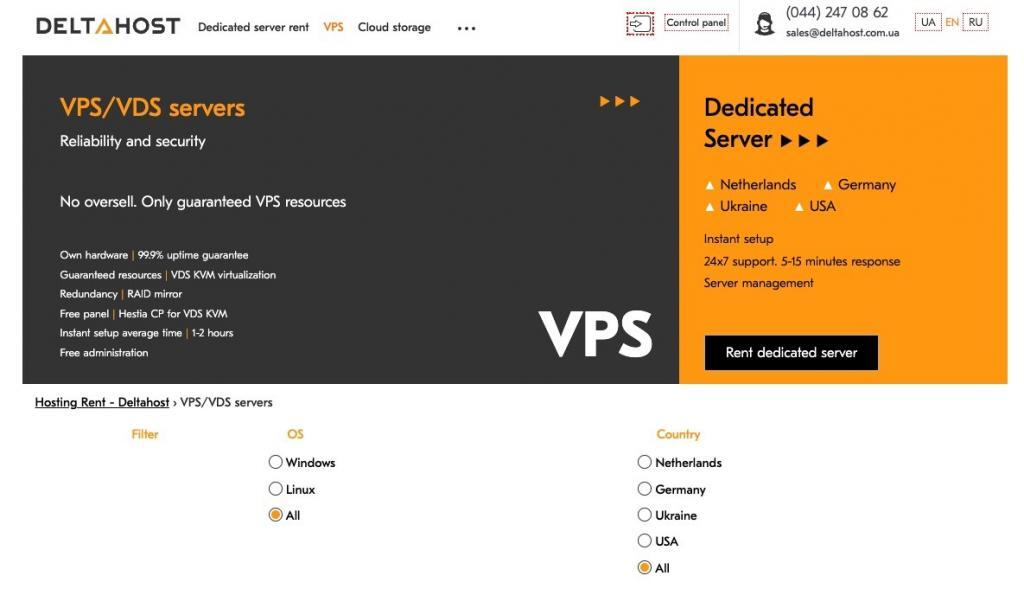
Why VPS on Linux Is the optimal choice
In the era of digital transformation, the speed, stability, and security of internet infrastructure play a crucial role in ensuring the success of any project — from a small e-commerce store to a high-load web application. Businesses and developers alike require reliable solutions that provide performance, flexibility, and cost-efficiency. One of the most effective ways to ensure technical stability is by renting a VPS on Linux — an optimized virtual server based on the most popular and robust Linux distributions.
VPS Platform: The Advantages of Linux
A Virtual Private Server (VPS) on Linux provides a secure, reliable, and scalable environment designed to meet the needs of modern web applications, e-commerce platforms, development environments, and more. It represents an isolated portion of a physical server, where users receive dedicated computing resources and full administrative control. This model bridges the gap between shared hosting and expensive dedicated servers, delivering optimal performance at a reasonable cost.
Unlike traditional shared hosting, where hundreds of users compete for the same CPU, RAM, and storage, a Linux VPS guarantees that your allocated resources remain exclusive to you. That means your application won’t slow down due to the activity of neighboring users. This is especially critical when hosting business-critical services, handling high web traffic, or running background processes that require consistent performance.
Here are the key advantages that make Linux VPS a superior choice:
-
Dedicated computing power (CPU, RAM, SSD): You are allocated a defined amount of system resources, ensuring better application performance and faster response times. Whether you’re processing customer orders on an online store or running background scripts, dedicated resources make a tangible difference.
-
Full root access for advanced customization: Linux VPS gives you superuser (root) privileges, meaning you can install, configure, and manage any software packages or system settings without limitations. Need to compile a custom NGINX module, configure a firewall, or fine-tune PHP settings? You’re in complete control.
-
Independent software stack tailored to your project: Each VPS runs in its own isolated environment, allowing you to choose specific versions of software, libraries, and frameworks. For example, while one project may require PHP 8.1 with Laravel, another might demand Python 3.11 with Django — both can be deployed in parallel on separate VPS environments.
-
Flexible scalability to match project growth: Start small and scale up. If your blog turns into a popular media portal, or your prototype evolves into a full-scale SaaS platform, you can easily upgrade your resources — add more vCPUs, increase RAM, or expand your SSD storage without migrating to a new infrastructure.
-
Support for automation tools and containers such as Docker and Kubernetes: Linux VPS is an ideal base for modern DevOps workflows. You can deploy containerized applications, manage microservices, or build CI/CD pipelines using tools like GitLab CI, Jenkins, Ansible, or Helm. With root access and Linux kernel-level control, system automation becomes seamless and efficient.
Moreover, Linux is known for its security and stability, making it a preferred operating system for server environments. Regular security updates, a large community of contributors, and robust permission management mechanisms provide peace of mind when hosting sensitive data or user accounts.
Let’s take a real-life scenario: imagine you’re building an online marketplace that must handle thousands of product listings, secure payment gateways, and continuous user traffic. A Linux VPS allows you to fine-tune the server stack — install Nginx for speed, MariaDB for database efficiency, configure fail2ban for intrusion protection, and even set up cron jobs for data backups — all within your own private environment.
Whether you’re a solo developer experimenting with personal projects or a business owner running a production website, a Linux-based VPS provides the perfect balance between power, flexibility, and affordability. And since most Linux distributions are open-source, you also save significantly on licensing fees compared to Windows-based solutions.
In short, a VPS on Linux is more than just hosting — it’s a development-friendly ecosystem where you’re in charge, your resources are guaranteed, and your applications run smoothly, securely, and efficiently.
These advantages make Linux VPS a powerful choice for developers, startups, and enterprises looking for high performance without the high price tag of dedicated servers.
Top Benefits of Linux VPS
Whether you’re building a startup or deploying a SaaS application, Linux VPS delivers key benefits that enhance both development and production environments:
- Stability under high loads — Ideal for traffic spikes and concurrent processes.
- Root access for system-level control — Customize your OS, install packages, and manage services freely.
- Broad distribution support — Choose from Debian, Ubuntu, CentOS, AlmaLinux, and more.
- Seamless integration — Compatible with Docker, Git, Node.js, Python, MySQL, and other tools.
- Open-source power — Most Linux distributions are free, reducing licensing costs.
Technical Features and VPS Plan Comparison
Here’s a breakdown of common Linux VPS hosting plans that suit various project requirements:
| Plan Name | CPU | RAM | SSD Storage | Price ($/month) | Supported OS |
|---|---|---|---|---|---|
| VPS-Lite | 1 vCPU | 1 GB | 10 GB SSD | $4.90 | Debian, Ubuntu, CentOS |
| VPS-Medium | 2 vCPU | 2 GB | 30 GB SSD | $8.90 | All major Linux distributions |
| VPS-Pro | 4 vCPU | 4 GB | 50 GB SSD | $15.90 | Ideal for high-load Linux solutions |
These plans can cover anything from small blog hosting to resource-intensive applications.
Common Use Cases for Linux VPS
A Linux VPS is an incredibly versatile tool. Typical use cases include:
- Hosting websites and CMS (e.g., WordPress, Joomla, Drupal)
- Running mail servers (Postfix, Exim, Dovecot)
- Creating secure VPN environments (OpenVPN, WireGuard)
- Cloud storage and backups (Nextcloud, ownCloud)
- Continuous Integration & Delivery (CI/CD) pipelines (Jenkins, GitLab, Docker)
- E-commerce platforms (Magento, PrestaShop, OpenCart)
Whether you’re a freelancer, developer, or small business owner, a Linux VPS offers the foundation for fast deployment and agile development.
Tips for Choosing the Right Linux VPS
Before selecting a plan, assess the technical demands of your project. Here are a few essential parameters to consider:
- CPU (vCPU): More cores enable better multitasking and processing power. Critical for databases, APIs, or heavy applications.
- RAM: 1-2 GB is sufficient for basic CMS; for large-scale applications or DBs, go for 4–8 GB or more.
- SSD performance: Faster read/write speeds translate to quicker website loading and database access.
- Operating System: For general-purpose use, Ubuntu or Debian are highly recommended for their community support and ease of use.
- Support & SLA: Choose a provider that offers reliable technical support and guarantees uptime, especially if you’re running a business-critical project.
Comparison of Leading VPS Providers
To help you make a well-informed decision, here’s a quick overview of some popular VPS providers:
| Provider | Min. Price ($) | Server Locations | OS Support | Support Quality |
|---|---|---|---|---|
| DeltaHost | $4.90 | EU, USA, Ukraine | Full Linux distro support | 24/7 multilingual, fast response |
| Hetzner | €5.40 | Germany | Ubuntu, Debian | Basic; no localized support |
| Bluehost VPS | $23.00 | USA | Limited Linux options | English-only, slower response |

As you can see, DeltaHost offers the most balanced value in terms of performance, OS flexibility, and multilingual support — making it a strong contender for your next VPS.
You can explore their VPS offerings here: https://deltahost.ua/vps.html
Final Thoughts: Why Linux VPS is Worth It
Opting for a VPS on Linux is a future-proof decision that balances cost, control, and flexibility. You get a scalable environment tailored to your exact needs — from minimal blogs to high-availability systems — all while enjoying the reliability of open-source technology.
👉 If you need affordability — Linux VPS is budget-friendly and avoids expensive software licenses.
👉 If you value control — root access and OS-level configuration offer unmatched flexibility.
👉 If you want performance — SSD-powered resources and modern CPU architectures ensure smooth operation.
No matter what kind of project you’re launching, a Linux VPS is a smart investment that grows with you. Choose a reliable provider, scale your resources as needed, and enjoy the power of open-source hosting.
